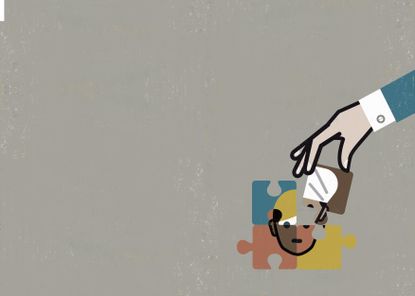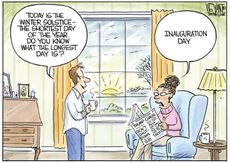Why are we so obsessed with the race and religion of mass killers?
America's foreign and domestic policy hinges to an insane degree on a killer's name and religion


For a few hours on Twitter and cable news on Wednesday night, there was a restless anticipation, as if everybody with a chyron or two thumbs was waiting at some imaginary line on a virtual track, waiting for the starting pistol.
A few hours earlier, everybody knew, two or three heavily armed people had shot up a center that helps disabled children in San Bernardino, California, killing 14 people and wounding 17 before escaping. The updates started trickling in: Police had surrounded a bullet-ridden black SUV; one person from the car was on the ground, motionless; one male and female suspect wearing "assault-style clothing" were dead, and a third possible suspect had been arrested after fleeing from the scene of the massacre. Politicians were tweeting out calls for gun control (Democrats) and "thoughts and prayers" for the victims (Republicans, mostly).
People were worried about the victims. Were they children with disabilities? Social workers dedicated to helping them live meaningful lives? People from the Department of Public Health trying to enjoy a holiday party at the facility?
Subscribe to The Week
Escape your echo chamber. Get the facts behind the news, plus analysis from multiple perspectives.

Sign up for The Week's Free Newsletters
From our morning news briefing to a weekly Good News Newsletter, get the best of The Week delivered directly to your inbox.
From our morning news briefing to a weekly Good News Newsletter, get the best of The Week delivered directly to your inbox.
But the real question on everyone's mind was this: Were the killers white people, Muslims, or something else? Lots of talking heads were tiptoeing around that question, but Bill O'Reilly just laid it out.
"We have to be careful here," O'Reilly told counterterrorism expert Aaron Cohen, a guest on Wednesday's show. "Very, very careful. If it is a terrorist attack, generated by fanatical Muslims, it becomes an international Paris-type story, with implications for the president of the United States on down. So we don't want to speculate." That didn't deter Cohen, who immediately responded: "My sources have also said that an Islamic name has been released. That is compounded by the fact that the attackers went to a specific place with tactical gear that would allow them to create maximum damage. I believe this is strongly linked to Islamic-motivated international terror."
The obvious inference is that if the shooting turned out to be "just a local beef in San Bernardino," as O'Reilly put it, it's just another mass shooting in America. We play this game every time there is a mass shooting in America: If the assailant has a Muslim-sounding name, we react one way, and if he (it's almost always a he) is white, we react another way.
Just think about that for a second. As you are undoubtedly aware, mass shootings are nothing new in the United States — there has been, on average, more than one a day this year, and Wednesday was no exception, with one person killed and three wounded in a mass shooting in Georgia. In 2015 alone, mass shootings — defined as four or more people shot — have left 462 people dead and 1,314 wounded.
Yet America's foreign and domestic policy hinges to an insane degree on a killer's name and religion.
If the murderer of 20 grade schoolers and six adults in Newtown, Connecticut, had been a Muslim from Nigeria, for example, do you doubt there would be thundering calls for eradicating Boko Haram? Instead, since he was a young white male, the U.S. essentially did nothing.
We don't yet know what prompted Syed Farook and his wife, Tashfeen Malik, to allegedly murder 14 people, and unless they left a note or manifesto, we may never be sure. Law enforcement hasn't ruled out terrorism, and maybe it will turn out they were radicalized at some mosque or on Twitter and wanted to become jihadis. But if somebody named, say, Robert Dear had crashed his own office Christmas party wearing "assault-style clothing" and murdered 14 of his colleagues or their guests, you can bet your pundit card nobody would be talking about international terrorism.
Motive does matter if we are serious about trying to address the cause and prevent future mass murders. But if it's a Muslim terrorist, "we" seem to think that lets "us" off the hook. Mostly, we appear interested in which Twitter/TV battle we are supposed to engage in: Is this a "foreigner" problem we can fix with bombing other countries and sealing America's borders, or a domestic problem we can tackle by enacting new gun legislation? If you disagree with either of those propositions, you can argue the other side.
More serious than this idiocy is the fact that one or two sociopaths can push America into foreign entanglements, if they have one specific type of last name and creed. Freedom of religion is a cornerstone of America's social contract, as is presumption of innocence. We betray both with this Pavlovian grief bifurcation.
Soon after Wednesday's shooting, BBC News reporter James Cook described the murder of 14 people in San Bernardino as "just another day in the United States of America. Another day of gunfire, panic, and fear." That stings. But given America's evolving reaction to the killings, we probably deserve worse.
Sign up for Today's Best Articles in your inbox
A free daily email with the biggest news stories of the day – and the best features from TheWeek.com
Peter has worked as a news and culture writer and editor at The Week since the site's launch in 2008. He covers politics, world affairs, religion and cultural currents. His journalism career began as a copy editor at a financial newswire and has included editorial positions at The New York Times Magazine, Facts on File, and Oregon State University.
-
 Today's political cartoons - December 22, 2024
Today's political cartoons - December 22, 2024Cartoons Sunday's cartoons - the long and short of it, trigger finger, and more
By The Week US Published
-
 5 hilariously spirited cartoons about the spirit of Christmas
5 hilariously spirited cartoons about the spirit of ChristmasCartoons Artists take on excuses, pardons, and more
By The Week US Published
-
 Inside the house of Assad
Inside the house of AssadThe Explainer Bashar al-Assad and his father, Hafez, ruled Syria for more than half a century but how did one family achieve and maintain power?
By The Week UK Published
-
 US election: who the billionaires are backing
US election: who the billionaires are backingThe Explainer More have endorsed Kamala Harris than Donald Trump, but among the 'ultra-rich' the split is more even
By Harriet Marsden, The Week UK Published
-
 US election: where things stand with one week to go
US election: where things stand with one week to goThe Explainer Harris' lead in the polls has been narrowing in Trump's favour, but her campaign remains 'cautiously optimistic'
By Harriet Marsden, The Week UK Published
-
 Is Trump okay?
Is Trump okay?Today's Big Question Former president's mental fitness and alleged cognitive decline firmly back in the spotlight after 'bizarre' town hall event
By Harriet Marsden, The Week UK Published
-
 The life and times of Kamala Harris
The life and times of Kamala HarrisThe Explainer The vice-president is narrowly leading the race to become the next US president. How did she get to where she is now?
By The Week UK Published
-
 Will 'weirdly civil' VP debate move dial in US election?
Will 'weirdly civil' VP debate move dial in US election?Today's Big Question 'Diametrically opposed' candidates showed 'a lot of commonality' on some issues, but offered competing visions for America's future and democracy
By Harriet Marsden, The Week UK Published
-
 1 of 6 'Trump Train' drivers liable in Biden bus blockade
1 of 6 'Trump Train' drivers liable in Biden bus blockadeSpeed Read Only one of the accused was found liable in the case concerning the deliberate slowing of a 2020 Biden campaign bus
By Peter Weber, The Week US Published
-
 How could J.D. Vance impact the special relationship?
How could J.D. Vance impact the special relationship?Today's Big Question Trump's hawkish pick for VP said UK is the first 'truly Islamist country' with a nuclear weapon
By Harriet Marsden, The Week UK Published
-
 Biden, Trump urge calm after assassination attempt
Biden, Trump urge calm after assassination attemptSpeed Reads A 20-year-old gunman grazed Trump's ear and fatally shot a rally attendee on Saturday
By Peter Weber, The Week US Published